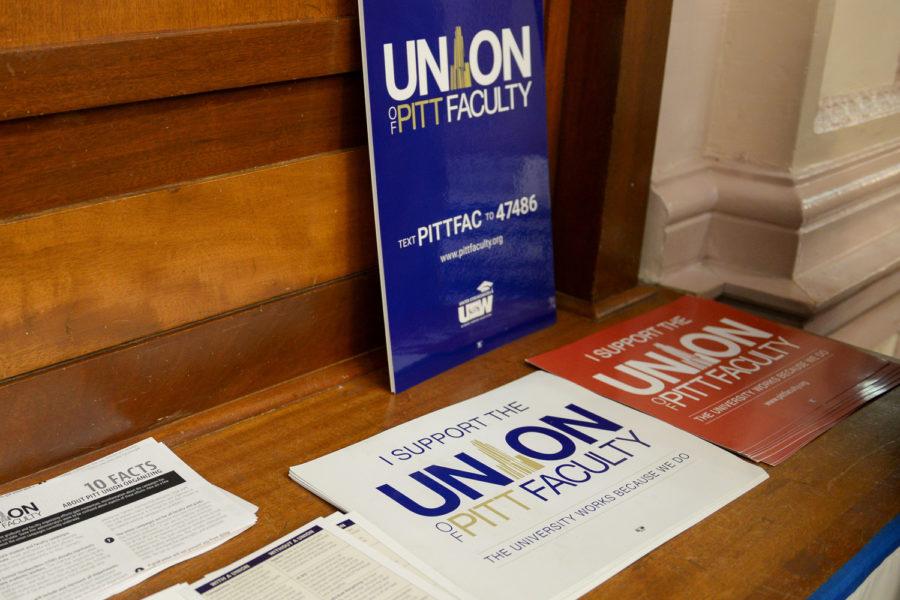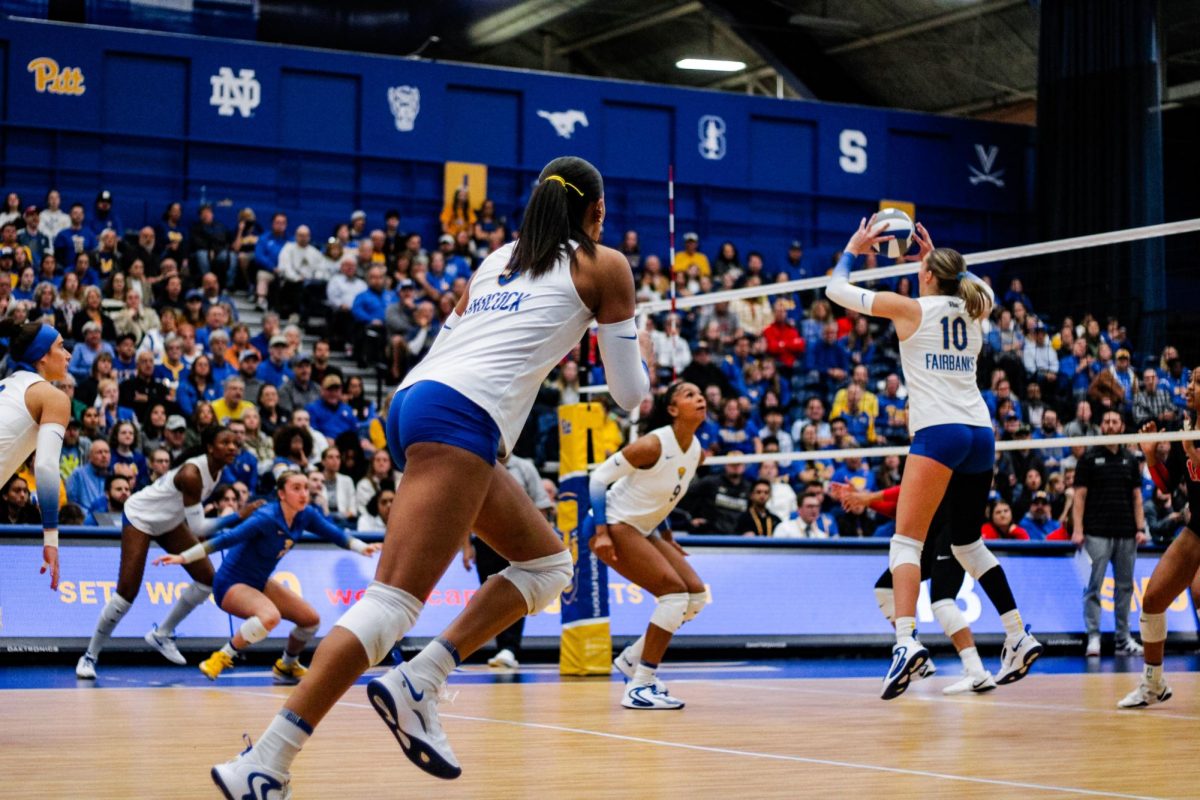Pitt removes administrators, retirees from faculty union eligibility
December 3, 2019
Faculty union organizers have argued since June that Pitt deliberately inflated its list of 4,018 union-eligible faculty with hundreds of retirees and administrators in order to derail unionization efforts. At the Pennsylvania Labor Relations Board hearings this week, Pitt’s attorneys agreed to remove more than 200 people from the proposed bargaining unit — 89 faculty who left Pitt or retired prior to last year and 152 administrators and department chairs.
Pitt claims the 89 former faculty were mistakenly included. After the University submitted its March 23 eligibility list to the Pennsylvania Labor Relations Board, its attorneys “stipulated a small number of individuals who were either included or excluded in error,” University spokesman Kevin Zwick said.
Pitt always wanted to exclude administrators from the eligibility list, Zwick said, but union organizers didn’t agree, so Pitt’s attorneys went ahead and included more than 150 administrators and department chairs. Union organizer Robin Sowards called Pitt’s claim “absurd” and said organizers made clear that they wanted to exclude supervisors. Neither side provided meeting minutes or phone transcripts to corroborate their version of events.
[READ MORE: A look at the back-and-forth between Pitt, faculty union organizers]
Pitt’s agreement to remove 200 inclusions from the list crosses off half the people in question, and leaves union eligibility up in the air for about 200 more. Pitt’s legal team and union organizers gathered at PLRB headquarters Monday for the start of a new round of hearings to debate whether or not those remaining names should be included in a faculty union bargaining unit.
Pitt agrees that faculty who left the University years ago don’t belong in a faculty union
The University sent a letter to organizers on Oct. 31 with a list of 89 former faculty originally included on the eligibility list that Pitt’s legal team would now “agree to exclude.” Pitt’s attorneys presented the letter at Monday’s faculty union hearings.
BStoUSWcoverLetter2019-10-31Most individuals in the letter either left Pitt years ago or never held faculty positions, according to their resumés, LinkedIn profiles and Pitt pages.
Marina Antic, now an assistant professor at Indiana University, hasn’t taught at Pitt since 2009.
Joseph Charlton and Patrick Bateman earned advanced degrees from Pitt in 2005 and 2008, respectively, but there’s no indication that either ever held a faculty appointment.
Matthew Connell and Aaron Cecala both left Pitt in 2014.
Several dozen individuals in the letter once held research or teaching appointments but left Pitt between 2015 and 2018, according to their Pitt pages and LinkedIn profiles. One former lecturer, Jack Klingler, calls himself a “retired guy” on his LinkedIn profile — he retired from Pitt in 2016.
The letter comes on the heels of a Pitt News investigation from October, which found that more than 100 of the inclusions on Pitt’s list of union-eligible faculty either supervised dozens of faculty or retired from Pitt years ago. According to precedent set by Temple University’s faculty union in 2015, faculty must have taught in both of the past two semesters to be considered eligible for a union. None of the individuals in Pitt’s letter have taught classes in the past year.
Six names from the letter — Antic, Seymour Drescher, Peter Koehler, Roy Marangoni, Marianne Novy and Frederick Pettit — were also listed in the investigation as individuals who likely did not belong in the bargaining unit because they all stopped teaching at Pitt several years ago.
Pitt has also agreed to include up to 15 individuals who weren’t originally on the eligibility list, according to the letter.
Pitt agrees to exclude administrators from a faculty union
Pitt’s attorneys presented a list of 152 administrators at the Monday hearings — deans, provosts, chancellors and department chairs, whose names were all enumerated in the The Pitt News’s October investigation — that Pitt now recommends excluding from a faculty union.
BSadminChairsList20191202Organizers complained as early as July that administrators should not be included in the bargaining unit. The University claims it said administrators should not be in the bargaining unit, but included them on the list anyway.
Zwick claims they were rightfully included on the eligibility list due to a lack of proper response during talks with union organizers.
“While the University proposed categories of who should be excluded as a manager or supervisor, we did not have agreement from [union organizers],” Zwick said.
Sowards rejects Pitt’s claim.
“We made clear … that we [wanted to] exclude the various deans, presidents, provosts and chancellors since they are all supervisory and/or managerial,” Sowards said.
Individuals who hold “supervisory” positions are typically not allowed in a union with the employees they supervise, according to the Public Employee Relations Act, which governs union policy in the public sector.
All deans control dozens of faculty employment contracts, so including them in a faculty union would place them on the same side of the bargaining table as the faculty they supervise. One administrator on the list, Associate Dean Holger Hoock, testified on behalf of administration at a set of graduate student union hearings in October 2018. Five months later, Pitt’s attorneys included Hoock on the list of faculty eligible for a union.
At the hearings Monday, organizers also submitted a list of 145 administrators they recommend excluding — only seven fewer than on Pitt’s list. The two parties will iron out any discrepancies between those two lists at Tuesday’s hearings.
pittFacAdminChairList20191202Other than that, this week’s hearings will also address the roughly 200 people whose union eligibility is still in question.
In July, PLRB Hearing Examiner Stephen Helmerich declared hundreds of inclusions on the eligibility list to be questionable and ordered Pitt to turn over employee records to organizers.
Sowards said the records show that some people on the list haven’t been employed by Pitt in many years, some people that organizers have challenged do, in fact, belong on the list and some inclusions are still up in the air because the record either doesn’t elucidate the individual’s employee status or because the document is “unreadable.”
Union organizers hope to determine the final size of the bargaining unit by the time the hearings wrap up on Wednesday. The PLRB would then rule again on whether union organizers collected enough signed authorization cards to prompt a union election in spring 2020, since the initial “showing of interest” fell short in April.
“The question now is not whether [Pitt] packed the list but by exactly how many hundreds they packed it,” Sowards said.
Editor’s note: This article has been altered to clarify the University’s claims regarding the creation of the bargaining list and the presentation of materials by Pitt’s attorneys at the PLRB hearings.



